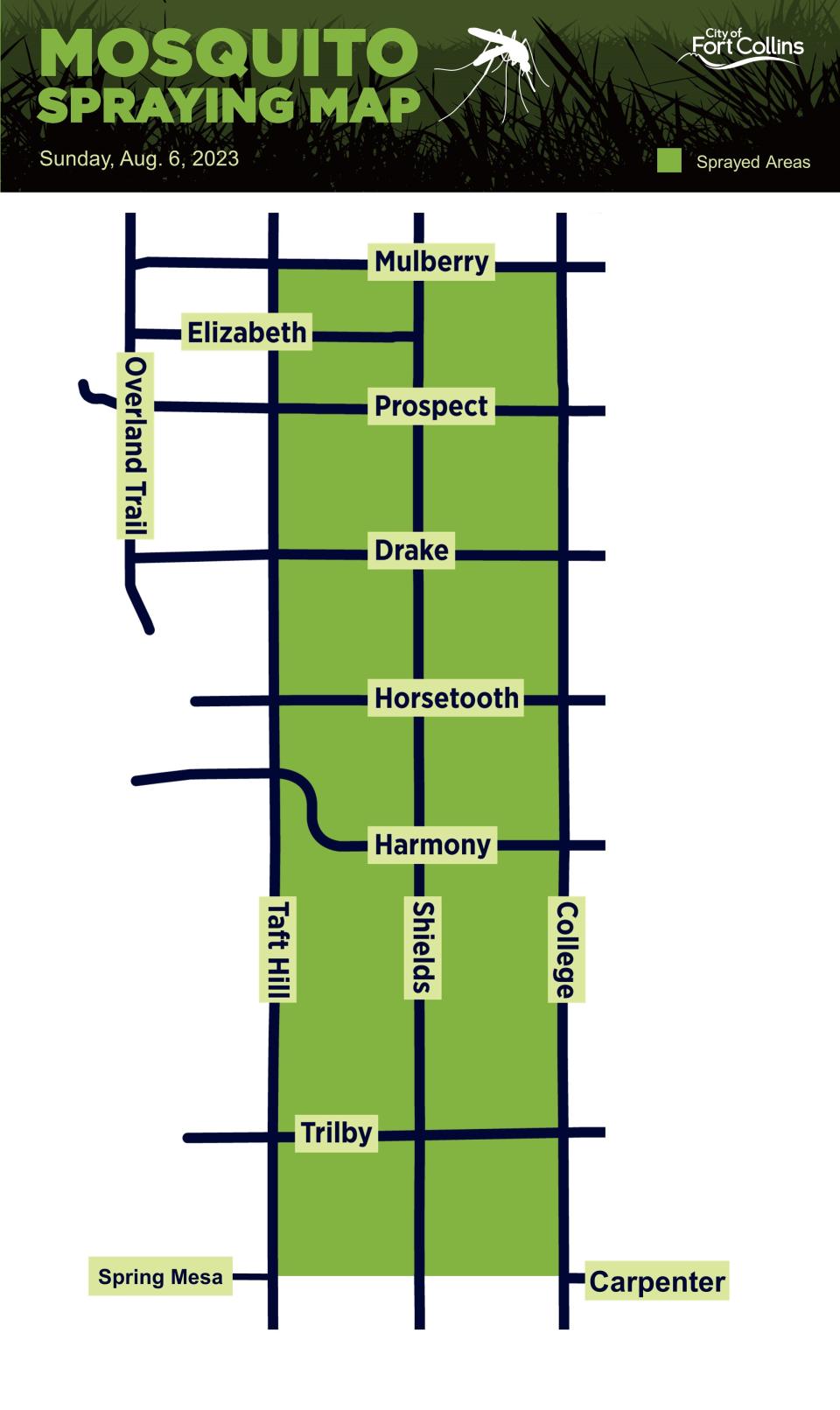Fort Collins to spray for West Nile mosquitoes for a third time this summer
Fort Collins will spray for mosquitoes that carry West Nile virus for a third time this summer.
This time, the routes will be in west Fort Collins, and for some areas within the zone, it will be the second time they are being sprayed this summer.
Spraying of a permethrin-based product in a fine mist will begin at 8 p.m. Sunday, Aug. 6, the city said in a news release Tuesday. The boundaries are Taft Hill Road on the west, College Avenue on the east, Mulberry Street on the north and Carpenter Road on the south.

To minimize pesticide exposure, residents and their pets should stay indoors and keep doors and windows closed for 30 to 60 minutes after spraying. Residents can further minimize pesticide exposure by covering organic gardens, ponds and water features with a sheet or tarp.
The contractor, Vector Disease Control International, will adjust its schedule to spray after the conclusion of any scheduled outdoor events going on through the city's parks and recreation departments, Poudre School District or Colorado State University, according to the city.
You can see the spraying map and track fogging trucks in real time Sunday at www.fcgov.com/westnile/.
Some areas within the Aug. 6 spraying zone were also sprayed on July 23: from Taft Hill Road on the west to College Avenue on the east and from Drake Road on the north to Trilby Road on the south.
The area northeast of Drake Road and College Avenue was sprayed on July 30.
The city said its decision to spray follows the recommendation by the Larimer County Department of Health and Environment and conforms to the city’s policy on West Nile virus management.
So far, one human case of West Nile virus has been reported in the county, affecting a resident of south Fort Collins, according to the Larimer County health department. A map on the Colorado department of health website says three people have confirmed infections statewide, with one in El Paso County and another in La Plata County.
The case in Larimer County was reported much earlier than last year's cases, likely because there's an unusually high number of mosquitoes carrying the virus right now due to the moisture the area received earlier this summer. The health department says there's an "unprecedented risk" of West Nile virus this summer.
Last year in the state, there were 206 reported human cases of West Nile virus, including 20 deaths, according to the Colorado Department of Public Health and Environment.
Who is most at risk of suffering from West Nile virus?
Those age 60 and older and those who have serious diseases and immune disorders are more likely than younger patients to have the most severe forms of the disease, according to Larimer County health department.
Chances of suffering the ill effects of West Nile virus
One in 150 people infected with West Nile virus will develop severe illness. Symptoms develop three to 14 days after infection and can include high fever, headache, neck stiffness, stupor, disorientation, coma, tremors, convulsions, muscle weakness, vision loss, numbness and paralysis. These symptoms may last several weeks, and neurological effects may be permanent.
20% who become infected develop symptoms, including fever, headache, body aches, nausea, vomiting and sometimes swollen lymph glands or a skin rash on the chest, stomach and back.
80% who are infected with the virus will not show any symptoms.
What you can do to reduce mosquitoes and their bites
Culex mosquitoes can lay eggs in as little as 2 inches of water.
Drain items such as bird baths, containers and kiddie pools.
Use DEET or other effective mosquito repellent.
Avoid exposure during peak Culex mosquito feeding times, which are dusk through dawn.
Wear long sleeves and pants to reduce skin exposure.
Coloradoan reporters Miles Blumhardt and Erin Udell contributed with previous reporting.
This article originally appeared on Fort Collins Coloradoan: Fort Collins to spray for West Nile-carrying mosquitoes for third time

